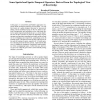875 search results - page 50 / 175 » Reasoning about Knowledge and Continuity |
123
click to vote
ERSHOV
2009
Springer
15 years 8 months ago
2009
Springer
Abstract. A basic cornerstone of the Semantic Web are formal languages for describing resources in a clear and unambiguous way. Logical underpinnings facilitate automated reasoning...
102
click to vote
IFIP
1992
Springer
15 years 6 months ago
1992
Springer
Retrieving relevant information in Data and Knowledge Bases containing a large number of di erent types of information is a non trivial problem. That is the reason why, in areas l...
167
click to vote
DILS
2008
Springer
15 years 3 months ago
2008
Springer
With over 80 file formats to represent various chemical attributes, the conversion between one format and another is invariably lossy due to informal specifications. In contrast, t...
157
click to vote
TPLP
2010
15 years 8 days ago
2010
In this paper we explore the use of Answer Set Programming (ASP) to formalize, and reason about, psychological knowledge. In the field of psychology, a considerable amount of kno...
110
click to vote
FLAIRS
2007
15 years 4 months ago
2007
In this paper, we extend Moss and Parikh’s approach to reasoning about topological properties of knowledge. We turn that system in a spatio-temporal direction by successively ad...

